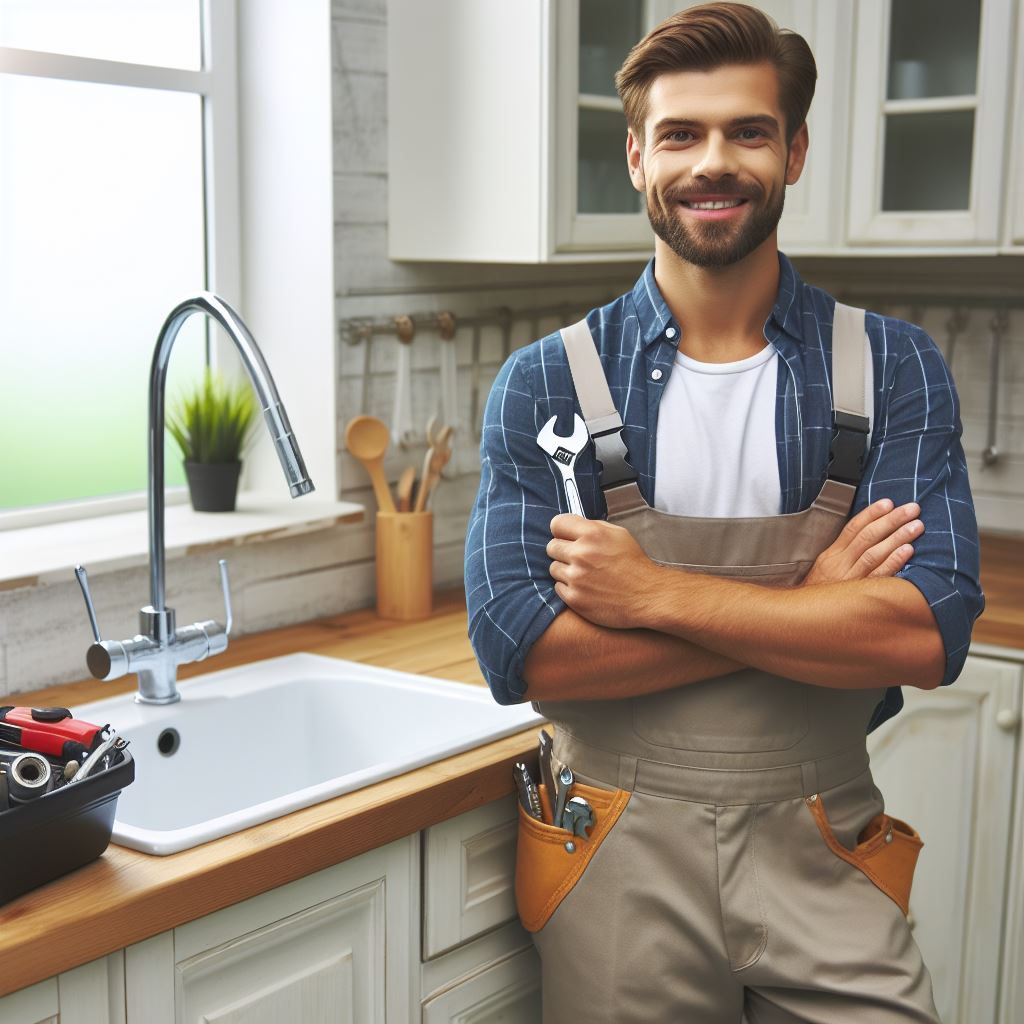Introduction
Plumbing maintenance is crucial for property owners as it ensures the smooth functioning of their plumbing systems.
Neglecting regular upkeep can lead to costly repairs and inconveniences.
In this blog post, we will explore the importance of plumbing maintenance and discuss some essential plumbing fixes that every property owner should master.
Regular plumbing maintenance helps property owners detect and address potential issues before they escalate into major problems.
It ensures that pipes, fixtures, and appliances are in optimal condition, preventing leaks, clogs, and water damage.
By keeping the plumbing system well-maintained, property owners can also improve water efficiency and reduce utility bills.
In this blog post, we will focus on plumbing fixes that property owners should learn to handle.
These fixes will empower them to handle common plumbing issues without relying on professional help, saving them time and money.
By mastering these fixes, property owners can take control of their plumbing system’s maintenance and address minor problems swiftly.
Throughout the blog post, we will provide step-by-step instructions and tips for various plumbing fixes, including unclogging drains, fixing leaky faucets, repairing toilet issues, and replacing damaged pipes.
We will also discuss the necessary tools and safety precautions to ensure that property owners can carry out these repairs effectively and safely.
By the end of this blog post, property owners will have a better understanding of the importance of plumbing maintenance and will feel more confident in handling common plumbing fixes.
Mastering these skills will empower property owners to keep their plumbing systems in excellent condition, saving them money and ensuring a hassle-free living environment.
Understanding the Basics of Plumbing
In the realm of homeownership, understanding the basics of plumbing is an invaluable skill that can save you time, money, and potential headaches.
Plumbing issues can arise unexpectedly, and having a grasp of the fundamental concepts can empower you to tackle minor problems before they escalate. Let’s delve into the essential elements every property owner should master.
Plumbing Systems and Components
Begin your plumbing journey by familiarizing yourself with the intricate network of plumbing systems within your property.
A typical residential plumbing system comprises water supply, drainage, and venting systems.
The water supply system delivers fresh water to various fixtures, while the drainage system removes wastewater.
Venting systems ensure proper air circulation, preventing sewer gases from entering your home.
Understanding key components like pipes, faucets, valves, and fixtures is crucial.
Pipes come in various materials, each with its pros and cons.
Faucets control water flow, valves regulate pressure, and fixtures encompass sinks, toilets, and showers.
Knowing how these components work together will enhance your troubleshooting abilities.
Common Terms and Concepts
Plumbing has its own set of jargon, and becoming familiar with these terms will empower you to communicate effectively with professionals or confidently undertake DIY fixes.
Phrases like “trap,” “septic tank,” and “water pressure” may seem intimidating, but grasping their meanings is pivotal.
For instance, a trap prevents sewer gases from entering your home, while maintaining optimal water pressure ensures efficient water flow.
Importance of Familiarizing Yourself
Being well-versed in plumbing basics is not just about fixing leaks or unclogging drains.
It’s about proactive maintenance and averting potential disasters.
Regularly inspecting visible pipes, checking for leaks, and addressing minor issues promptly can prevent major problems down the line.
In short, plumbing knowledge is an essential skill for every property owner.
By understanding the basics, you gain confidence in addressing minor plumbing issues, ultimately preserving the integrity of your home and sparing yourself from costly repairs.
So, roll up your sleeves, delve into the world of plumbing, and empower yourself as a savvy homeowner.
Read: Handling Tenant Repair Requests Efficiently
Identifying and Fixing Common Plumbing Issues
Leaky Faucets
Leaky faucets can be caused by worn-out seals or O-rings.
To fix a leaky faucet, turn off the water supply and replace the faulty parts.
Prevent future leaks by regularly checking and maintaining your faucets.
Clogged Drains
Drain clogs can occur due to the buildup of hair, grease, or foreign objects.
Clear clogged drains using methods like using a plunger, drain snake, or chemical cleaners.
Take precautions to avoid future clogs by using drain screens and avoiding pouring grease down the drain.
Running Toilets
Running toilets are often caused by a faulty flapper or valve in the tank.
Diagnose and resolve toilet running issues by adjusting the flapper or replacing the valve.
Save water and reduce toilet running by installing a dual-flush or low-flow toilet.
Low Water Pressure
Low water pressure can be caused by clogged pipes, a faulty pressure regulator, or a water leak.
Troubleshoot low water pressure by checking for clogs, adjusting the pressure regulator, or fixing leaks.
If troubleshooting doesn’t work, it’s advisable to call a professional plumber for assistance.
Fixing Minor Pipe Leaks
Owning a property comes with its fair share of responsibilities, and one crucial skill every homeowner should master is fixing minor pipe leaks.
These pesky leaks may seem inconsequential, but neglecting them can lead to significant water damage and inflated repair costs.
In this section, we’ll explore the art of detecting small leaks, applying temporary fixes, and the importance of addressing leaks promptly and permanently.
Detecting Small Leaks in Pipes
Detecting minor leaks early on is key to preventing larger plumbing issues.
Keep an eye out for water stains on walls or ceilings, the sound of dripping water, or unusual spikes in your water bill.
A visual inspection of exposed pipes can also reveal small drops or dampness.
Leverage your senses and be proactive in identifying these subtle signs.
Temporary Fixes to Stop Minor Leaks
When you spot a minor leak, immediate action can prevent further damage.
For a quick fix, start by turning off the water supply to the affected area.
Use a pipe repair clamp or a rubber patch with a hose clamp to seal the leak temporarily.
Epoxy putty is another handy tool for creating a temporary seal.
Remember, these fixes are just a stopgap measure until you can address the issue permanently.
Importance of Addressing Leaks Promptly and Permanently
Ignoring small leaks is a recipe for disaster.
Even a seemingly insignificant drip can lead to mold growth, structural damage, and skyrocketing water bills.
Promptly addressing leaks not only safeguards your property but also saves you money in the long run.
Invest time in finding the root cause of the leak and apply a permanent solution.
Whether it’s fixing a cracked pipe, replacing a worn-out joint, or tightening loose fittings, addressing the underlying issue ensures a leak-free future.
All in all, mastering the art of fixing minor pipe leaks is a fundamental skill for any homeowner.
Detecting leaks early, applying temporary fixes when necessary, and addressing the issue permanently are essential steps to safeguarding your property and your wallet.
Stay vigilant, be proactive, and tackle those leaks head-on to maintain a well-functioning plumbing system in your home.
Read: Hiring Contractors: What Every Landlord Should Know

Dealing with Frozen Pipes
As a responsible property owner, it’s crucial to be equipped with the knowledge of addressing frozen pipes, a common and potentially damaging issue during colder months.
Understanding the risks associated with frozen pipes, implementing preventive measures, and mastering the art of thawing are key skills every property owner should possess.
Understanding the Risks of Frozen Pipes
Frozen pipes pose a significant threat to your property.
When water freezes inside pipes, it expands, creating immense pressure that can lead to cracks and bursts.
The aftermath can result in water damage, structural issues, and costly repairs.
Moreover, frozen pipes can disrupt water supply, leaving you without a functioning plumbing system.
Preventive Measures to Avoid Frozen Pipes
- Insulation: Ensure that all exposed pipes, especially those in attics, basements, and crawl spaces, are adequately insulated. This helps maintain a consistent temperature, preventing pipes from freezing.
- Sealing Cracks and Gaps: Identify and seal any gaps or cracks in your property’s foundation, walls, and windows. These openings can allow cold air to penetrate, increasing the risk of freezing.
- Heating: Keep your property adequately heated, even during colder periods. Insulate vulnerable areas and consider using heat tape on pipes susceptible to freezing.
Methods to Thaw Frozen Pipes and Minimize Damage
- Identify the Frozen Section: If a faucet isn’t producing water or you notice strange odors, it’s crucial to identify the frozen section. This is typically where the ice blockage is located.
- Apply Heat Safely: Use a hairdryer, heat lamp, or towels soaked in hot water to apply heat to the frozen pipe. Never use an open flame or electrical devices near water to avoid accidents.
- Open Faucets: As you apply heat, open faucets to allow water to flow, aiding in the melting process.
By mastering these techniques, you can tackle frozen pipes head-on, minimizing potential damage and avoiding costly repairs.
Remember, prevention is the first line of defense, so implement these measures before the temperatures drop, ensuring a smooth and worry-free plumbing system throughout the winter months.
Read: Cost-Saving DIY Maintenance Tips for Your Property
Maintaining and Servicing Water Heaters
Water heaters are essential appliances in every household, providing hot water for various purposes like bathing, cooking, and cleaning.
To ensure their optimal performance and longevity, regular maintenance is crucial.
In this section, we will discuss the importance of regular water heater maintenance, steps to flush and descale water heaters, and signs of water heater problems.
Importance of Regular Water Heater Maintenance
Regular maintenance of water heaters is essential for several reasons.
First and foremost, it helps extend the lifespan of the appliance.
By keeping the water heater well-maintained, property owners can minimize the risk of breakdowns and costly repairs.
Furthermore, regular maintenance ensures that the water heater operates efficiently, which can result in energy savings.
A properly maintained water heater consumes less energy, reducing the utility bills associated with heating water.
Regular maintenance also helps maintain water quality.
Over time, sediments and mineral deposits can accumulate in the tank, affecting the water’s taste and quality.
By flushing and descaling the water heater regularly, property owners can prevent these issues and enjoy clean, fresh water.
Steps to Flush and Descale Water Heaters
Flushing and descaling water heaters should be done periodically to remove sediments and mineral deposits. Here are the steps you can follow:
- Turn off the power supply to the water heater. For electric water heaters, switch off the circuit breaker. For gas water heaters, turn off the gas supply valve.
- Close the cold water supply valve to stop the flow of water into the heater.
- Attach a hose to the drain valve located at the bottom of the tank. Place the other end of the hose in a suitable drainage area.
- Open the drain valve and allow the water to flush out of the tank completely.
- Once the tank is empty, open the cold water supply valve to fill it partially. Repeat the flushing process until the water runs clear.
- To descale the water heater, mix a descaling solution following the manufacturer’s instructions. Pour the solution into the tank and let it sit for a few hours.
- After the designated time, drain the solution from the tank by opening the drain valve.
- Finally, close the drain valve, remove the hose, and turn on the power supply or gas valve to resume normal operation.
Signs of Water Heater Problems and When to Seek Professional Support
Recognizing the signs of water heater problems is essential to address issues promptly and avoid further damage.
Here are some common signs that indicate potential problems:
- Inconsistent or inadequate hot water supply
- Strange noises coming from the water heater
- Leakage around the tank or pipes
- Foul-smelling or discolored water
- Increase in energy bills without any other explanation
If any of these signs are noticed, property owners should seek professional support.
Attempting to fix complex water heater issues without proper knowledge and tools can be dangerous and may lead to more significant problems.
A qualified plumber can diagnose the problem accurately and provide the necessary repairs or replacements.
Regular maintenance checks by professionals can also help prevent water heater problems before they occur.
Therefore, maintaining and servicing water heaters are essential skills that every property owner should master.
By understanding the importance of regular maintenance, following the steps to flush and descale the appliance, and knowing when to seek professional support, property owners can ensure their water heaters operate efficiently and last for years to come.
Read: Rental Pricing Strategies to Attract Tenants
Additional Tips and Precautions for Property Owners
As a property owner, it is crucial to be proactive when it comes to plumbing maintenance.
Alongside mastering basic plumbing fixes, there are additional tips and precautions that can further safeguard your property and save you from expensive repairs.
In this section, we will discuss four essential aspects: installing and maintaining effective sump pumps, managing grease traps in kitchen plumbing, understanding the significance of water shut-off valves, and conserving water to reduce utility bills.
Installing and maintaining effective sump pumps
One of the key steps to protect your property from flooding is to install an effective sump pump.
These pumps are specifically designed to remove water that accumulates in basements or crawl spaces.
Regular maintenance of sump pumps, including testing the functionality and clearing any debris or blockages, is crucial to ensure they operate optimally when needed.
Managing grease traps in kitchen plumbing
When it comes to kitchen plumbing, managing grease traps is essential.
Grease traps prevent grease and oil from entering the plumbing system and causing clogs.
Regularly cleaning and maintaining these traps will not only prevent costly plumbing issues but also promote a healthier environment.
Understanding the significance of water shut-off valves
Another important precaution for property owners is understanding the significance of water shut-off valves.
Knowing the location of the main shut-off valve and other individual shut-off valves throughout your property can save you from water damage during emergencies or plumbing repairs.
In case of a burst pipe or a plumbing issue, shutting off the water supply swiftly will minimize potential damage.
Conserving water and reducing utility bills
Conserving water is not only beneficial for the environment but also helps reduce utility bills.
Simple steps like fixing leaks promptly and using low-flow fixtures can significantly decrease water consumption.
Additionally, implementing efficient irrigation methods like drip irrigation or using rainwater harvesting systems for outdoor plants can make a significant difference in water conservation.
Ultimately, as a responsible property owner, it is important to go beyond basic plumbing fixes and consider additional tips and precautions.
Installing and maintaining sump pumps, managing grease traps, understanding water shut-off valves, and conserving water are all essential aspects that can contribute to the overall functionality, safety, and cost-effectiveness of your property’s plumbing system.
By mastering these practices, you can ensure the long-term well-being and value of your property while minimizing the chances of costly plumbing repairs.
Conclusion
In summary, mastering plumbing fixes as a property owner is crucial for various reasons.
Firstly, it allows you to save money by avoiding costly repairs and replacements.
Additionally, it enables you to maintain the functionality and efficiency of your plumbing system, ensuring a comfortable living space.
Furthermore, continuously improving your plumbing skills and knowledge is highly encouraged.
With new technologies and techniques emerging, staying up-to-date will empower you to handle any plumbing issue that may arise in the future.
However, it is important to remember that professional help should be sought when needed.
There are instances when certain plumbing problems require specialized tools, expertise, or legal licenses.
In those situations, it is wise to rely on qualified plumbers who can efficiently and safely handle the task at hand.
By mastering plumbing fixes, property owners can greatly benefit both financially and in terms of convenience.
Investing time and effort to learn and improve plumbing skills will undoubtedly pay off in the long run.
So, keep learning, stay proactive, and have confidence in tackling plumbing issues in your property.
And when necessary, be sure to contact the experts to ensure a successful resolution.




